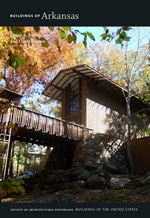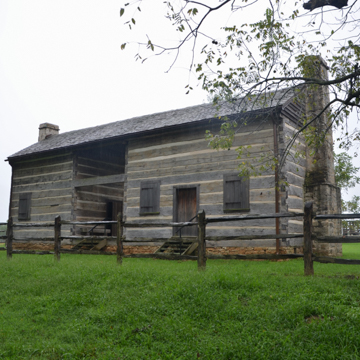This one-and-a-half-story log dogtrot was built on the bank of the Eleven Point River. Built of red and white oak and chinked with mud, the house has pens of unequal sizes, and each has exterior end chimneys constructed of stone quarried from the river’s bank. William Looney was one of the earliest settlers in the area, arriving from Tennessee with three slaves. He grew a variety of crops and planted an apple orchard. As at the Rice-Upshaw House (RA4), Black River Technical College historic-architecture carpenter Ronnie Walker restored the building. During the restoration physical and archaeological evidence revealed that Looney had used the building for his extensive distillery business, rather than merely as a house.
You are here
Looney-French House (William Looney Tavern)
If SAH Archipedia has been useful to you, please consider supporting it.
SAH Archipedia tells the story of the United States through its buildings, landscapes, and cities. This freely available resource empowers the public with authoritative knowledge that deepens their understanding and appreciation of the built environment. But the Society of Architectural Historians, which created SAH Archipedia with University of Virginia Press, needs your support to maintain the high-caliber research, writing, photography, cartography, editing, design, and programming that make SAH Archipedia a trusted online resource available to all who value the history of place, heritage tourism, and learning.















